- Home
- Evelyn Waugh
Helena Page 10
Helena Read online
Page 10
The Empress Fausta was accustomed to talk freely and without fear of contradiction. Eusebius often told her that she had a man’s mind in her grasp of a problem. But now as she drew to the close of her briefing she became aware that all was not quite well. The Empress Helena was regarding her with a look of thunderous disapproval.
After an awful pause, Helena asked: “And how is Crispus?”
“We always speak of him as ‘Tarquin.’ ”
“Indeed. Pray do not let me influence you in the matter. I prefer to call my son and grandson by their own names.”
“Well, you’ll find it makes people very shy. Anyway, Tarquin is not much talked about at the moment. I think he’s in some kind of trouble.”
“That sounds most unlikely.”
“Well, don’t quote me. I never enquire into such things. All I know is, that he is not much talked about. Such a shame. He’s really a very fetching boy.”
“I shall call at the Palatine shortly and satisfy myself.”
“Yes, do. I don’t know quite who you’ll find. Gracchus isn’t seeing anyone at the moment. He’s in one of his moods. My dear, I haven’t even set eyes on him myself since that terrible day of the Knights’ Procession. But of course I shall be very pleased to see you. I’d like to show you my bath. Gracchus had it put in for me when I moved from the Lateran. It really is something very special. Every minute I spend anywhere else seems pure waste of time. I could die there quite happily. In fact, to tell you the truth, I ought to be there now. If I don’t get my two hours every afternoon I’m fit for nothing at dinner.”
When Helena went to her room that night she found something nasty, a little roll of paper, on her pillow which read: Fausta is an adulteress.
She burned it in disgust and had all the household woken and questioned. None could explain its presence.
It did not readily occur to the Empress Fausta that she made a bad impression. She came again next day bringing with her Eusebius, the celebrated Bishop of Nicomedia. “Marcias writ large,” thought Helena the moment she saw him. He had fine dark eyes and a beautiful voice. He knew just how to treat great ladies.
“And how is our friend Lactantius?” he asked. “Tell me, ma’am, what did you make of his Deaths of the Persecutors? I confess I wasn’t quite happy about it. There were parts which, really, I could hardly believe he wrote. A kind of brusqueness. I can’t help thinking it was a mistake his going to live in the West.”
“There are many excellent young poets at Trèves,” said Helena.
“Of course, of course, and I know how much they owe to your Majesty’s patronage. But, I wonder, are young poets quite the sort of company Lactantius needs? These earnest young backwoodsmen have a richness of imagination, a feeling for nature, a sense of the primitive virtues which we all applaud, but surely a writer of Lactantius’s character should live in the heart of things.”
“Do you feel in the heart of things here, Bishop? Do you find the Romans backwoodsmen?”
Eusebius gave her the sweet and quizzical glance that won all hearts—or nearly all; not Helena’s. “Your Majesty is very direct. Is that a fair question to put to a simple clergyman? Of course, wherever the Emperor holds court is the heart of things but—may I be direct too?—one does hear talk of a Great Move, does one not?”
“Does one?”
“Let me put it this way. Rome has a past. Rome is the past. But what of the future? Is it too rash to hint that perhaps in a few hundred years it will be laughable to speak of it as the center of Christendom? A great commercial center, no doubt. The primatial see still, possibly. I daresay as a mere matter of ceremony the Bishop of Rome will always take first place. But when we consider the great lamps of Christian civilization, where in the future will we look? to Antioch, Alexandria, Carthage.”
“Nicomedia and Caesarea,” said Fausta.
“Perhaps even to those humble sees also, ma’am. But certainly not to Rome. Romans can never be Christians. The old religion is deep in their blood. It’s part of their whole social life. Of course there have been plenty of conversions in the last ten years, but who are they? Almost all Levantines. The solid core of the City, the knights and senators, the genuine Italians, are all heathen at heart. They’re just waiting till the Emperor goes, to restart the old shows in the Colosseum. They say they’re glad to see the Christians getting fat. That is why it sometimes seems rather a pity to be spending so much money here on building all these enormous churches. What do you think?”
Only once did he touch directly on theology. “I don’t suppose you are much troubled by controversy at Trèves,” he said.
“We are conservative there.”
“Well, ma’am, it is a highly specialized question.”
“And the specialists have lately decided for conservatism; yourself, too, I believe.”
“Yes, yes, we all voted dutifully with the majority. It is not an occasion to remember with pride. I said to our impetuous Egyptian friend as we came away: ‘Better men fared thus before you.’ I can’t say it seemed to comfort him very much; yet after all what is a majority? A wave of irrational sentiment, a lump of unconsidered prejudices. Human reason survives such rebuffs. What happened to Troy? It seemed impregnable and a few men and a wooden horse brought it down. The forts of folly will fall in the same way. No, I am not greatly impressed by the Priams and Hectors of Nicaea.”
That evening Helena found a message under her window: Eusebius is a heretical Arianizer.
“My correspondent has certainly got something there,” she thought. “I wonder if he was right about Fausta.”
On another day Constantia came with her son Licinianus, a glum, shifty boy, rising twelve. His life, like a Greek drama, had been full of great happenings off-stage while a chorus of nurses, aunts and tutors held him perpetually bemused. Once he had had a resplendent papa who moved in and out of his small world to the sound of trumpets. And then had fallen a great silence in which his papa’s name was never mentioned in his presence again. Now he lived under the same gilded roof as the most alarming of all his family, the highly scented lady who bewilderingly was both aunt and great-aunt to him and seemed thus the heiress of a double portion of malevolence; often when he looked up from his listless games, he caught Aunt Fausta’s terrible fish-eyes on him with an expression which loosed all his muscles and made him wet the floor. Nothing interested this little boy; it was as though he were here on such a short visit, in such a strange land, that it was really not worth while trying to understand anything.
“So you’ve met our darling Bishop,” said Constantia. “Do tell me what you thought of him.”
“Creepy-crawly.”
“Oh.”
“What is the matter with the boy? Why can’t he keep still?”
“He’s a little nervous.”
“Of me?”
“No, no. He is always nervous. I’m sure I don’t know why.”
“You should take him away to somewhere healthy.”
“Oh, we couldn’t leave Gracchus. He’s been so kind to us. The moment our backs were turned people would start saying things about us. You don’t know what they’re like. And I couldn’t bear to have Gracchus think anything nasty about us. But I expect the whole court will go East again soon. I do hope so. I don’t like Rome, do you?”
“It’s not quite what I expected.”
“I don’t feel the Romans really appreciate Gracchus. There was that shocking affair the other afternoon when the Knights had their procession. Tell me are these your own slaves?”
“I brought them with me, most of them.”
“Then I suppose it’s all right to speak freely.”
But she spoke with great caution. Every subject, domestic or public, seemed to crawl with possible misunderstanding. Presently Constantia rose to go.
“Tell Crispus to come and see me,” said Helena.
Constantia winced. “Tarquin? Yes, I will, certainly, if I see him.”
“Why should you not see him? H
e’s at the Palatine, isn’t he?”
“Yes, but it’s so large, so much ceremony, so many different establishments. Sometimes one goes days without seeing anyone.”
That evening the message which Helena had come to expect, folded this time in the crack of her door, read: Beware of the conspirator Licinianus.
*
All the royal ladies called. Word had gone round that Helena was indeed someone to be reckoned with. Often she was out sightseeing, often she was in church; but in the course of the first ten days the whole doomed Flavian family managed to meet her. By each she sent a message to Crispus and at last he came, unheralded, after dark. He threw himself into his grandmother’s arms and when he stood back he was weeping.
They talked late. Twice in that night he thought he heard movements on the terrace outside and had the garden searched by linkmen. Once he threw open the door suddenly but found in the passage only a faithful old maid from Gaul who was trimming the lamps.
“It seems to me you have all worked yourselves up into an extraordinary state of nerves on the Palatine,” said Helena. “The whole lot of you. You’re just like that wretched little boy of Constantia’s. I shall have to have a word with your father.”
“I have not spoken to him for three weeks,” said Crispus.
“You ought to get out and about more.”
“I did when we first came to Rome. Several of the senators gave parties for me. They were great fun. There’s something different about a Roman party. Everything in Nicomedia is so stiff and official. Here things are much more luxurious and at the same time much easier-going. I suppose they’ve been giving parties longer. I was quite a lion when I first arrived. And the people seemed to have taken a fancy for me. They used to put up a cheer when they saw me. It was all rather jolly. I don’t show my face anywhere now.”
“What happened?”
“Nothing happened. Nothing ever does happen in the palace. Of course there were a lot of anonymous letters. One gets used to those. It’s what doesn’t happen that gets one down. No one says anything but suddenly you feel you’re in disgrace; everyone keeps clear of you. You know you’ve put your foot in it somewhere but no one says how. I’ve seen it happen with other fellows. It begins with the eunuchs. They just seem not to notice one. Then the family take it up and then the fellow doesn’t appear anymore. Someone else moves into his rooms and no one asks anything about him and everything goes on as if he had never existed at all. Sometimes the fellow turns up again. He’s just been off somewhere on a job. Usually they never turn up.
“I think Fausta’s got something against me. Heaven knows what. We used to be jolly thick together. In fact, I almost thought she was keen on me at one time.”
“Crispus.”
“Oh, Fausta’s always keen on someone. I don’t think Papa minds. He’s far too busy talking religion.
“That’s another thing. I can’t stand all these clergymen about the place. They’re worse than the eunuchs.”
“I am a Christian.”
“Yes, I know, Grandmamma. I’m all for it. I mean it’s not my kind of thing, but I’m all for fellows having whatever religion they fancy. But all this arguing night and day about heresy and orthodoxy. Papa never stops and I don’t believe he understands a word of it, any more than I do. And now they talk as if our war in the East had been mixed up in it. It’s such rot. My men weren’t fighting for Christianity. They were fighting to put Papa on top. And we won and he’s on top and that’s all there is to it. It makes you feel such an ass being told afterwards that you were fighting for religion.
“That’s another thing. It isn’t for me to say it, but everyone knows I did pretty well in the war. I’m really quite brainy when it comes to fighting. I think I might get some credit for it. I don’t care about titles more than the next man but if they are going to make a Caesar, why not me? Why that kid Constantius?
“It’s not only clergymen either. The Palatine’s full of soothsayers—Sopater and Hermogenes and a frightful old fraud called Nicagoras. Do you know Papa sent Nicagoras v.i.p. by Imperial Post to Egypt to attend a magician’s congress? I tell you life is hell on the Palatine. I’ve applied a dozen times to rejoin the army. No reply. Some eunuch just goes off with the papers and that’s the last one hears of it.”
So Crispus poured out all his grievances long held in silence and Helena’s heart yearned towards the baffled hero. At length she said: “I’m sure it’s mostly imagination. If there is anything wrong, a word will put it right. Your father is a good man. Remember that. He’s got all sorts of things to worry him and he may have some bad advisors. But I know my own son. There’s nothing mean about him. I’ll go and see him at once and everything will be all right.”
So at length Helena sent a firm message that she would come to the Palatine and demanded that Constantine fix an hour for her visit.
*
The guards were at the present, eight deep. Persian carpets were spread on the steps. Trumpets sounded the royal salute as Helena stepped from her litter. Constantine was there to embrace her.
It was nearly twenty years since they had met.
Save for his height and his upright carriage, the conqueror of the world did not seem particularly military. From the neck down he was all upholstery. A surcoat of imperial purple, laced with floriations of gold wire and studded with amorphous pearls, hung stiff as a carpet to the carpeted floor. It was sleeveless, and at the arms an undergarment billowed out, peacock-hued, ending in lace ruffles and a pair of coarse, much-jeweled hands. Above the surcoat was a wide collar of gold and enamel, a massive thing suited to the bull-neck; its miniatures told indifferently the stories of the Gospel and of Mount Olympus. Above the collar rose the face, pale now as his father’s; he was rouged but purely for ornament; there was no attempt to counterfeit the ruddy complexion of the camp. The surface of the face was in some sort of motion. The Emperor was trying to smile.
But it was none of these things which first caught the notice of Helena.
“My dear boy, what on earth have you got on your head?”
The face above the collar assumed an expression of alarm.
“On my head?” He put up a hand as though to dislodge some bird which might inadvertently have perched there. “Is there anything on my head?”
Two courtiers danced forward. They were shorter than Constantine and made little jumps to see what was amiss. Without excess of ceremony Constantine inclined to them. “Well, what is it? Take it off at once, whatever it is.”
The courtiers craned and peered; one raised a finger and touched. They looked at one another. They looked at the Empress Dowager in abject consternation.
“That green wig,” said Helena.
Constantine straightened. The courtiers relaxed.
“Oh,” he said, “dearest Mother. How you frightened me! It’s just a little thing I popped on this morning. I have quite a collection. You must ask to see them. Some are very pretty. Today I was in such a hurry to see you, I took the first that came to hand. Don’t you like it?” he asked anxiously. “Do you think it makes me look pale?” He took her hand and led her indoors. “You are not too tired after your journey?”
“I’ve only come from the Celian.”
“I mean your journey from Trèves.”
“I have been in Rome three weeks.”
“And I was never told! Why was I not told? Until I got your letter yesterday I had no idea you had arrived. I was most anxious about you. Tell me, honestly—no one tells me anything honestly—how do you think I am looking?”
“Pale.”
“Exactly. I thought as much. They always tell me I look so well, and then they overwork me.”
Constantine led her through the ante-rooms with slow ceremonious steps. Their way was lined with bowing figures. Helena had expected an intimate conversation in privacy. That, plainly, was not Constantine’s plan. She was led to the Throne Room. Constantine settled himself and waved her to a seat on his right hand only slightly
less magnificent than his own. Fausta, who had joined them in their progress, sat on his left. Then the court took its place round and behind them with suitable gradations of obeisance.
“To work, to work,” said the Thirteenth Apostle.
“I want to talk to you,” said Helena.
“And I to you, dear Mother. But duty first. Where are those architects?”
Unlike Diocletian, the fount and origin of all this ceremony, Constantine liked to transact business in full court. For Diocletian pageantry had been a breathing-space, time to think in the intervals of an exacting routine. His real consultations and decisions were made in a study no bigger than a tent, without witnesses so that one precarious life only guarded each secret of state. For Constantine the liturgy of the court was the very substance of royalty. And his secrets were the darker.

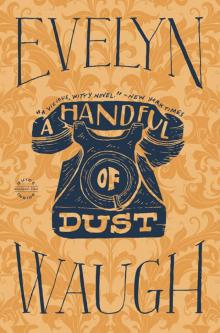 A Handful of Dust
A Handful of Dust Complete Stories of Eveyln
Complete Stories of Eveyln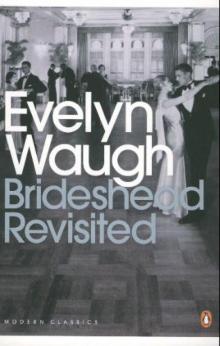 Brideshead Revisited
Brideshead Revisited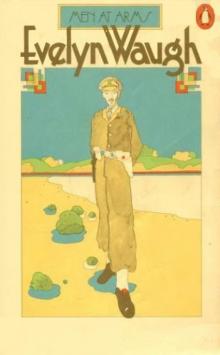 Men at Arms
Men at Arms Black Mischief
Black Mischief When the Going Was Good
When the Going Was Good Officers and Gentlemen
Officers and Gentlemen Helena
Helena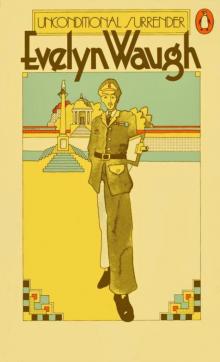 Unconditional Surrender
Unconditional Surrender The Ordeal of Gilbert Pinfold
The Ordeal of Gilbert Pinfold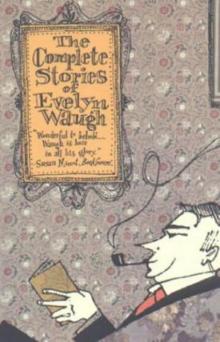 The Complete Stories Of Evelyn Waugh
The Complete Stories Of Evelyn Waugh